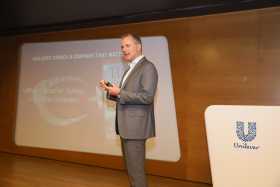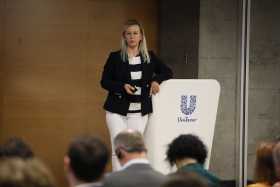
Unilever’in Sürdürülebilir Yaşam Planı kapsamında geleneksel olarak düzenlediği Paydaş Çalıştayı, sivil toplum temsilcileri, sosyal girişimciler, akademisyenler, medya ve iş dünyasından 70’e yakın uzmanın katılımıyla gerçekleştirildi.
Çalıştayda, Unilever’in mevcut sürdürülebilirlik hedeflerinin ötesini anlamak ve paydaşlarının görüşlerini almak amacıyla gerçekleştirdiği küresel araştırmanın sonuçları ilk kez paylaşıldı. Unilever’in değer zincirindeki 276 kilit paydaşın yanı sıra dünya çapındaki 40 bini aşkın çalışanının katıldığı araştırma, şirketten gelecekte odaklanması beklenen öncelikleri ortaya koydu.
Unilever Determines the Sustainability Road Map Together With Shareholders
The traditional Stakeholder Workshop of Unilever organized within the Sustainable Life Plan, was carried out with the participation of NGO representatives, social entrepreneurs, academics, approximately 70 experts from the world of media and business. The results of the global research done by Unilever in order to see beyond the current sustainability targets and get the opinions of the shareholders were shared for the first time at the workshop. Alongside the 276 key stakeholders in Unilever’s value chain, over 40 thousand employees worldwide took part in the research, which put forward the priorities expected to be focused on by the company in the future.
Brands Supporting Sustainable Life Grew Faster in 2017
Unilever’s ‘Sustainable Life Supporting Brands’, which have integrated sustainability as a business model into all their activities, showed a better performance than the company’s average growth rate in 2017 as well as in the last three years. These ‘Sustainable Life Supporting Brands’ showed a faster growth rate of 46% compared to the rest of Unilever, comprising 70% of the total growth turnover. In Turkey brands like OMO, Dove, Lipton, Knorr, Domestos, Signal, Algida, Elidor made up 72% of the total growth of Unilever Turkey by showing a growth rate of 44%.
Unilever gets opinions on sustainability from stakeholders
The Chairman of the Board of Unilever Turkey, Central Asia and Iran, Harm Goossens pointed out that sustainable life brands are the locomotive of growth in Turkey too, saying that they have started the greatest ever ‘listening survey’ in order to hear and understand the views of their employees and key stakeholders worldwide on their current sustainability targets and beyond. Alonside Unilever’s 276 key stakeholders including investors, suppliers, clients, creative agengies, opinion leaders, NGOs and academics, over 40 thousand workers of all functions from 21.000 production facilities worldwide participated in this survey named “Have Your Say.” In the survey which took more than three months, the participants were asked their views on the priorities they wished Unilever to focus on. It was observed that the answers given by the shareholders were similar to those given by the employees.
Unilever will play a leading role in the solution of the trust issue as well
Ebru Şenel, Director of Sustainable Business and Communications of Unilever Turkey, pointed out a serious trust issue worldwide. She said, “In our day, people do not trust each other, the states, the NGOs, and even the universities. As Unilever, we believe that it is critically important to build faith in every area of life, and we play a leading role in this.”

Stakeholders’ Meeting 2018: “Women are more aggrieved by issues. Awareness must be increased at all levels!”
At the 4th Stakeholder Workshop organized by Unilever, focusing on the empowering of women and the young, ‘food waste’, ‘Sustainable nutrition’, ‘Packaging waste’, ‘Water’, and ‘Health and Hygiene’ issues were discussed. Close to 70 professionals from non-government organizations, academic circles, media, and the business world set up separate tables to discuss solution proposals and their expectations from Unilever. Following the discussions, at the end of the workshop, the consensus was that it was necessary to increase consciousness and awareness of sustainability in Turkey. Also, the support of the media and the need for communication on the relevant topics were emphasized. Among the commonly accepted topics was the fact that women were more affected by such issues and that the young should participate more in the solutions.
The topic at the Food Waste table was that while one out of every nine people was starving in the world, 200 million people could be fed on the wasted food in Europe only. It was stated that the main reason for this problem was the imbalance between supply and demand and lack of planning in the production stage. It was also emphasized that new generations should be educated starting from kindergarten and that this must be done without creating ‘Eco Phobia’ in the children.
At the Health and Hygiene table, the necessity of producing environment and nature friendly products, increasing label-reading literacy, pilot applications throughout Turkey, preventing information pollution, and adapting an ‘equitable’ approach in the solutions was discussed.
The discussions at the Packaging Waste table focused on the topics of ‘Design’ and ‘Redesign'. The demand was that the private sector should increase R&D investments and the cooperation between the academy and R&D, stress indigenization, and support attempts at start-up level.
The prominent demand at the Water Management table was the updating of environmental policies. The necessity to examine the best samples in the world like Holland came up and it was requested that the topic of water be put on the curriculum, and the initiatives that the young take part in voluntarily be supported. Also, it was stated that Unilever could determine a common water agenda with the business world organizations and thus make a road map for the Turkish private sector.
At the Sustainable Nutrition table the discussions revolved around ‘Nutritional behaviour problems’, ‘Food Safety’, and ‘Access to Food.’ The necessity to convey the correct message in the solution of these problems, reaching a common point, communicating via correct models was stressed.
Consumers’ demand for sustainable brands is on the increase
Unilever’s other global surveys also show that the demand of the consumers for sustainable brands continues to increase. While 33% of consumers buy sustainable brands, 21% claim that they have the tendency to buy such brands, thus the potential market share of sustainable brands has reached 54%. As sustainability continues to become a life style, this comes forward as a great opportunity for Unilever.

